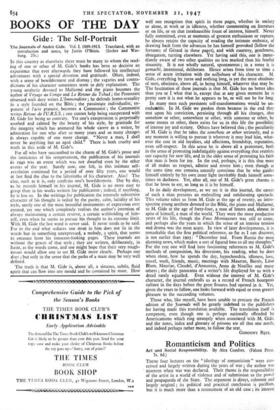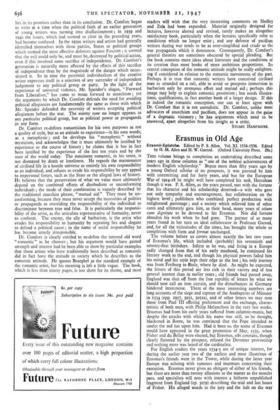Romanticism and Politics
THESE four lectures on the " ideology of. romanticism " were con- ceived and largely written during the years of war • the author was nineteen when war was declared. Their theme is the responsibility of the artist in a world of violence and of submission to the power and propaganda of the State. The argument is direct, coherent and largely original ; its political and practical conclusion is pacifism, but it is much more than a restatement of an old case ; its interest
lies in its premises rather than in its conclusion. Dr. Comfort began to write at a time when the political faith of an earlier generation of young writers was turning into disillusionment ; in 1939 and 1940 the issues, which had seemed so clear in the preceding years, had become confused. In the 193os writers and artists had generally identified themselves with those parties, States or political groups which seemed the most effective defences against Fascism ; it seemed that the evil could only be, and must be, destroyed by political action, even if this involved some sacrifice of independence. Dr. Comfort's generation is naturally more affected by the effects of this sacrifice of independence than by the magnitude of the danger which neces- sitated it. So in time the perennial individualism of the creative writer expresses itself in a rejection of any surrender of independent judgement to any political group or party. In the light of the experience of universal violence, Mr. Spender's slogan, " Forward from Liberalism," has come to mean forward to anarchism ; yet the arguments by which Dr. Comfort defends the need for avoiding political allegiances are fundamentally the same as those with which Mr. Spender defended the necessity of writers accepting political allegiances before the war. The enemy now no longer appears as any particular political group, but as political power or propaganda in any form.
Dr. Comfort re-defines romanticism for his own purposes as not a quality of style, but as an attitude to experience—in his own words, as a metaphysic ; and he develops his " metaphysic " without mysticism, and acknowledges that it must ultimately be justified by experience or the course of history ; he claims that it has in fact been justified by the experience of the last ten years and by the state of the world today. The consistent romantic, in his sense, is not dismayed by death or loneliness. He regards the .maintenance of civilised life in a hostile universe as entirely his own responsibility as an individual, and refuses to evade his responsibility by any appeal to impersonal forces, such as the State or the alleged laws of history. He believes that the preservation of what we value must ultimately depend on the combined efforts of disobedient or unconforming individuals ; the mode of their combination is vaguely described by the traditional anarchist phrase, "mutual aid." They must be un- conforming, because they must never accept the necessities of politics or propaganda as overriding the responsibility of the individual to discriminate between true and false. It is particularly the responsi- bility of the artist, as the articulate representative of humanity, never to conform. The enemy, the ally of barbarism, is the artist who evades his responsibility to humanity by repeating lies and slogans to defend a political cause ; in the name of social responsibility he has become utterly irresponsible.
Dr. Comfort is clearly entitled to re-define the tattered old word " romantic " as he chooses ; but his argument would have gained strength and interest had he been able to show by particular examples that those artists who have traditionally been described as romantic did in fact have the attitude to society which he describes as the romantic attitude. He quotes Brueghel as the standard example of the romantic artist, but his meaning is left a little vague. The book, which is less than ninety pages, is too short for its theme, and most
readers will wish that the very interesting comments on Shelley and Zola had been expanded. Material originally designed for lectures, however altered and revised, rarely makes an altogether satisfactory book, particularly when the lectures specifically refer to conditions which no longer exist ; and any defence of pacifism written during war tends to be as over-simplified and crude as the war propaganda which it denounces. Consequently, Dr. Comfort's general theories are sometimes obscured by special pleading. But the book contains more ideas about literature and the conditions of its creation than most books of more ambitious proportions. Its central conception of the romantic attitude might be really enlighten- ing if considered in relation to the romantic movements of the past. Perhaps it is true that romantic writers have conceived civilised man as stranded on a raft, able to avoid or postpone immersion in barbarism only by strenuous effort and mutual aid ; perhaps this image may help to explain romantic pessimism ; but needs illustra- tions, qualifications, in fact another book of a larger design. If this is indeed the romantic conception, one can at least agree with Dr. Comfort that it is not unrealistic. Dr. Comfort, unlike most advocates of anarchism and pacifism, does not appear in, the guise of a dogmatic visionary ; he has arguments which need to be answered, apart altogether from his insight as a critic.
STUART HAMPSHIRE.



































 Previous page
Previous page